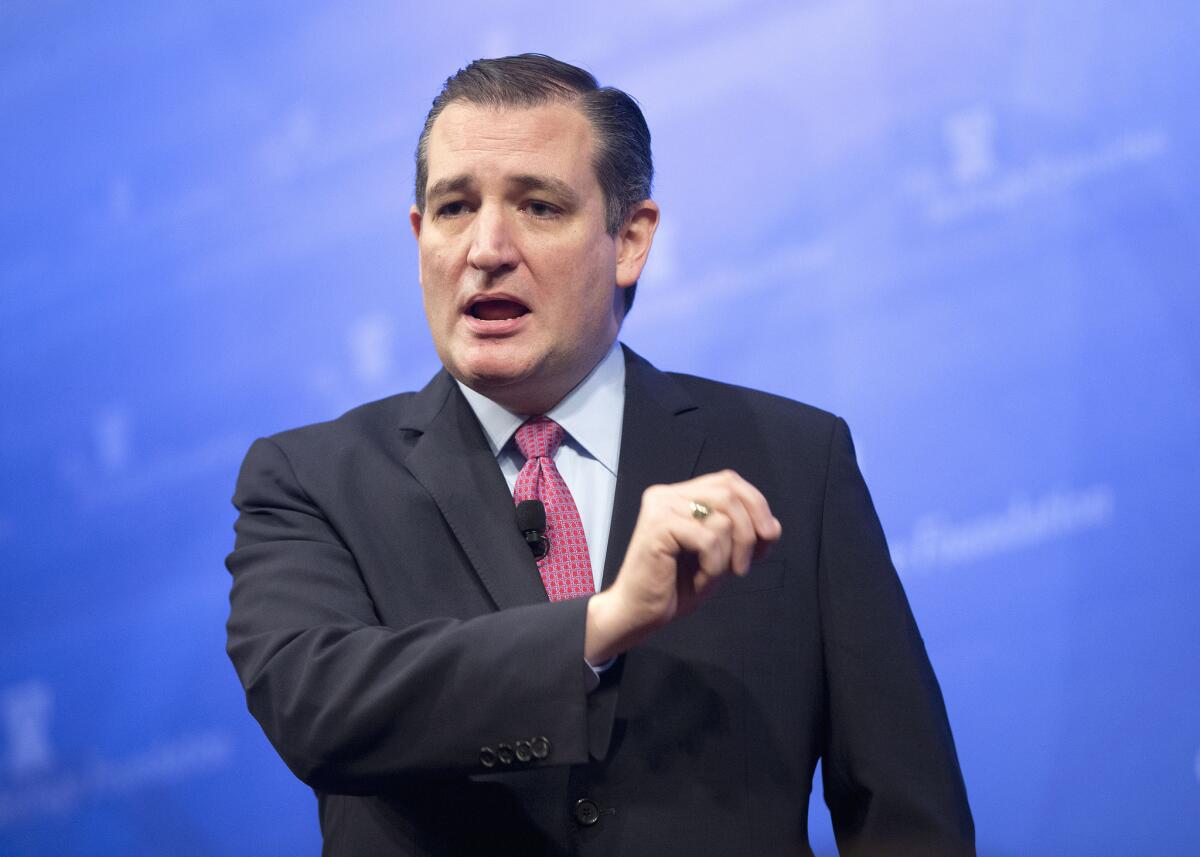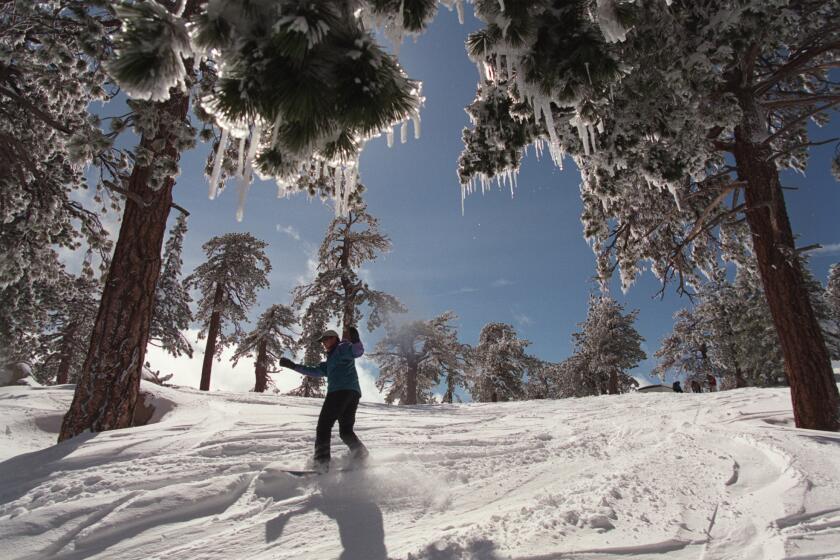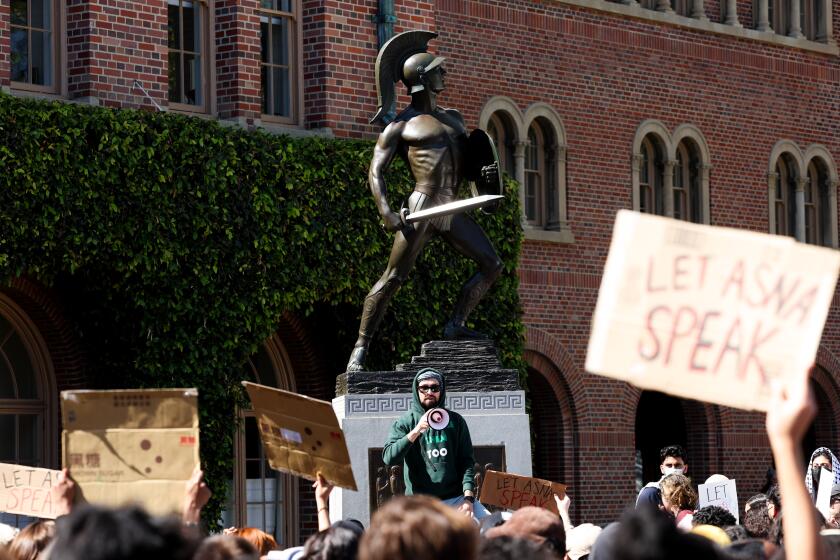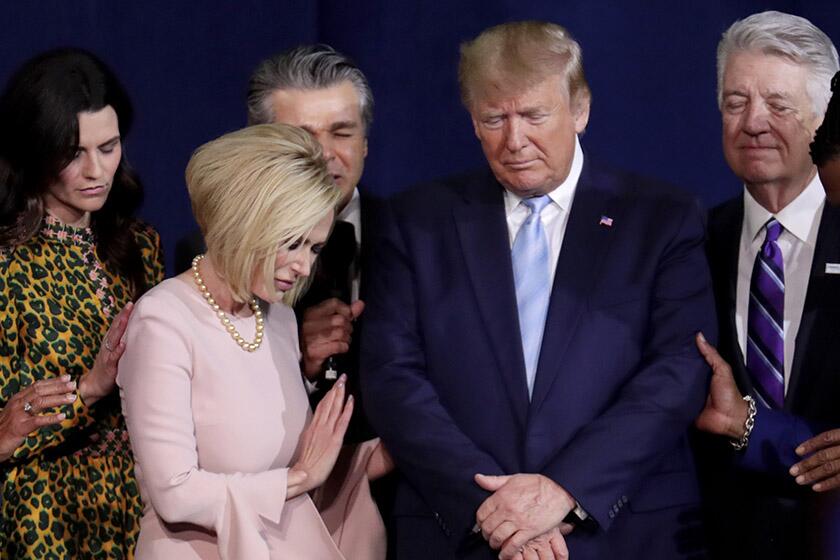Opinion: Ted Cruz and Ben Carson trade places in poll rankings

Republican presidential candidate Sen. Ted Cruz (R-Texas) speaks at the Heritage Foundation in Washington, D.C., on Dec. 10.
Are Dr. Ben Carson's 15 minutes over?
Two new polls show Carson fading badly in Iowa, whose caucuses mark the start of the primary voting. Because evangelical Christians are legion among caucus voters, Iowa is a state Carson should do well in, given his campaign themes. But as the election turns toward security and foreign policy, voters may be looking for someone with experience in government.
Say, a freshman senator -- like Ted Cruz! Because, you know, it worked so well in 2008.
The Des Moines Register says Cruz's rise, which has been meteoric in the state, reflects the voters' continuing interest in someone who'll act like an outsider, albeit with enough experience to handle the demands of the job:
The anti-establishment congressional agitator has made a rapid ascent into the lead in the GOP presidential race [in Iowa], with a 21-percentage-point leap that smashes records for upsurges in recent Iowa caucuses history. ...
Cruz, a Texas U.S. senator famous for defying party leaders and using government shutdown tactics to hold up funding for the Obamacare healthcare law and abortion provider Planned Parenthood, was the favorite of 10% of likely Republican caucus-goers in the last Iowa Poll in October. He's now at 31%.
According to the Register, Carson dropped from 28% two months ago to 13%, and from first place to third. Donald Trump slipped less dramatically, sliding from 23% in August to 21% now.
A Wall Street Journal/NBC News poll found a similar swap between Cruz and Carson nationally, although in their results, Trump held onto the lead. When asked which of the 10 top candidates they would vote for today, 27% picked The Donald -- up from 23% in late October -- and 22% picked Cruz, up from 10%. Carson, who led the poll in late October with 28%, fell to fourth, with 11%, behind Sen. Marco Rubio, who rose from 11% to 15%.
Per the Journal's Janet Hook, Cruz's newfound support came largely from especially conservative voters who used to back Carson:
Support for Mr. Cruz among voters who most strongly oppose same-sex marriage and abortion rights increased to 27%, from 14% in October. Meanwhile, for Mr. Carson, support among those voters dropped to 14%, from 34% in October.
Similarly, Mr. Cruz’s support among voters who call themselves “very conservative” rose by 23 percentage points, while Mr. Carson’s support among that group dropped by 23 points.
According to the National Review, Cruz's rise could spell doom for Trump's campaign too:
The consultant Frank Luntz convened a focus group last week of Trump supporters — he found that they showed remarkable loyalty to the real estate mogul and scant interest in other candidates. But a small exception to the pattern emerged: Ted Cruz, who has avoided criticizing Trump in hopes that Trump’s voters will move toward him. Luntz doesn't see Trump fading before Iowa votes, but his research shows a potential vulnerability if Trump is “shown to have hurt people who have worked for him.”
Karl Rove, who was White House political director under George W. Bush, has hinted that those ads are coming.
Oooh, scary! Or not, in the view of Roger Stone at Breitbart, who explained why Trump. Cannot. Be. Stopped:
Incredibly, Trump’s rivals and critics have still not figured out that establishment attacks on Trump only galvanized his substantial lead in the polls and make the possibility that he could run the table in the early caucuses and primaries.
Trump’s fundamental appeal is based on a voter perception that he is not part of the “political class” and that because he is self-financing, he is not beholden to any special interest, corporate interests, billionaires or Washington insiders. Voters believe that Trump could therefore take on a fetid system that they see corrupted by corporate money and highly paid lobbyists.
Unhinged attacks on Trump that reached near hysterical levels this week only reinforce Trump’s status as an outsider as voters increasingly lump big media with big government and big business in their disgust.
America has lacked leadership for so long that when an unscripted, uncoached and genuine Donald Trump lays out a blunt prescription for America in a straightforward display of alpha male leadership, voters in unprecedented fashion respond.
Anyone who paid attention during the long 2008 and 2012 campaigns knows that polls are mere snapshots, and as Kristen Soltis Anderson explains, blurry ones at that. Candidates can bounce up and down -- witness Newt Gingrich and Rick Santorum in 2012, for example. But a more common result, at least in those two years, is that voters moved from candidate to candidate like a speed dater, falling in love briefly with one after another before making a long-term commitment.
We've already seen one meteoric rise and fall, that of erstwhile Iowa front-runner Wisconsin Gov. Scott Walker. Like Walker, Carson has no foreign policy experience, and unlike Walker, no dealings at all with homeland security. Events may have shifted the campaign away from a generic referendum on Washington dysfunction to a more specific one on Washington's handling of Islamic State and other security threats. If so, it's not a shift that plays to Carson's strengths.
Today's selection of Trump reads from around the world:
It's time to worry about Donald Trump
The Economist expresses alarm about the U.S. and European surge in populism
French voters break it off with nationalist Maurine Le Pen -- kinda sorta
Follow Healey's intermittent Twitter feed: @jcahealey
A cure for the common opinion
Get thought-provoking perspectives with our weekly newsletter.
You may occasionally receive promotional content from the Los Angeles Times.




